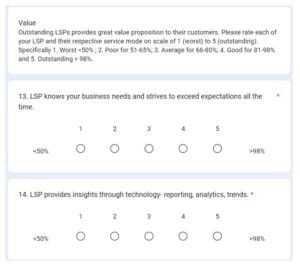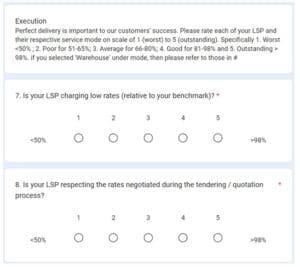 Amplifying the shipper’s voice and giving some power back to the companies actually paying for logistics services – that is the core reason why the Shippers’ Council was formed in in 2020. An interest group of the Singapore-based Logistics & Supply Chain Management Society (LSCMS), the Shippers’ Council is a professional association that counts members from organizations with a vested interest in logistics, including end users, technology and service providers, government and academia. Other sub-groups of LSCMS include LogiSYM, a leading event platform in the Asia region for the dissemination and sharing of trends and best practices in logistics, and the CargoNOW industry news website and magazine.
Amplifying the shipper’s voice and giving some power back to the companies actually paying for logistics services – that is the core reason why the Shippers’ Council was formed in in 2020. An interest group of the Singapore-based Logistics & Supply Chain Management Society (LSCMS), the Shippers’ Council is a professional association that counts members from organizations with a vested interest in logistics, including end users, technology and service providers, government and academia. Other sub-groups of LSCMS include LogiSYM, a leading event platform in the Asia region for the dissemination and sharing of trends and best practices in logistics, and the CargoNOW industry news website and magazine.
The term “shipper” can sometimes cause confusion, as it is often understood by the layman to be the entity that physically ships the goods from origin to destination. But in the context of the Shippers’ Council, the shipper is the cargo owner (or BCO – beneficial cargo owner), usually a manufacturer, who contracts with a logistics service provider (LSP), which, in the Council’s definition, can be a transportation (land, sea, air) company, an express company, a forwarder, or a full-fledged 3PL.
Knowledge Sharing
Since its launch in 2020, the Shippers’ Council has grown its membership to 93 represented companies. While almost all are based in Singapore, they are multinationals with Asia wide responsibility, such as Schneider Electric, Western Digital, Decathlon, Karcher and VF Corp. As evidenced by a very active Whatsapp group, the knowledge sharing element of the Council is highly valued by the membership.
For example, that sudden increase in warehousing charges from my LSP – is anyone else seeing that? Or I am evaluating a new global trade management software provider – anyone else had good/bad experience with them? As well as online, physical interaction between members is also enabled through organized events throughout the year as well as a major meeting at the LogiSYM Asia Pacific conference in Singapore.

Shippers’ Council meeting at LogiSYM Asia Pacific 2024 in Singapore.
The KPI
Harnessing the collective experience of shippers in a more formal way is the KPI, a benchmarking survey for evaluating the performance of logistics service providers. The survey is open to all shippers, not just those on the Shippers’ Council, with the qualification that they must spend at least US$1 million a year with an LSP in order to grade their performance.
The set of 20 questions, filled in via a Google Form, elicits information on shipment types, transport modes, routes, and then on a five-point scale (1 to 5), the Execution performance of the LSP – on-time delivery, billing accuracy, above/below market rates, etc., and the Value provided by the LSP – understanding of business needs, analytics, exception alerts, visibility, etc.
The “ideal” LSP ranks highly on both Execution and Value, and this is the sweet spot LSPs should aspire to. However, it is also possible to execute well but not provide good value, and vice versa, which signals the need for attention and room for improvement. And of course, an LSP judged to execute poorly and deliver low value service is clearly not satisfying its shipper client.


Sample questions from the KPI survey
Rankings and Results
Results from previous surveys throw up interesting nuggets of information on shippers’ preferences. For example, for all the talk about the importance of sustainable practices and the provision of digital solutions, it is pricing that is paramount in shippers’ minds when evaluating their shipper’s performance, with LSPs offering competitive rates ranking higher than their peers. Seemingly then, shippers are quite happy to get into discussions about sustainability and digitalization but far less keen to want to pay for it.
At the industry aggregate level, shippers from the life sciences and consumer sectors appear to be the most unhappy with the service from their LSPs, which score lower on Execution and Value than counterparts in High Technology and Industrial. Taken another way, this could also mean that shippers in these sectors are more demanding and have higher expectations of their providers.
For LSPs catering to ocean freight, the KPI survey reveals superior execution performance of pure-play shipping lines versus ocean forwarders (NVOCCs) but inferior value provision. This is most likely because the shipping lines have closer control of the transportation element, but forwarders can better assist shippers in aspects such as trade compliance requirements and also offer more extensive technology solutions for e.g. shipment tracking and reporting.
An Index to Excellence
Providing a level of measured visibility on logistics service provider performance is an important step towards increasing operational excellence. An LSP that executes well and offers superior value will make shipper supply chain operations more effective as well as efficient. An LSP that scores highly on the KPI Index is more likely to be retained by the shipper. For one that does not, there is the opportunity to initiate a call to action to improve performance where it is identified to be lacking.
While the LSP benchmarking survey has mostly been restricted to Asia based respondents, the Shippers’ Council is keen for it to go global. As such, readers of Logistics Viewpoints who qualify in terms of being a shipper that contracts at least $1 million a year with one or more of their LSPs are encouraged to participate in the latest survey, which closes at the end of January 2025
All respondents will receive a free copy of the survey findings, which are independently analyzed and collated by a local academic institution. Individual responses will remain confidential. You can find the survey link here. Your contribution to advancing logistics excellence is appreciated.
















